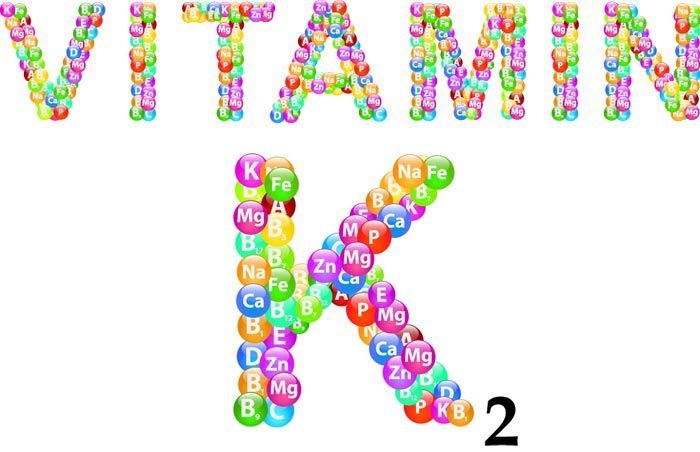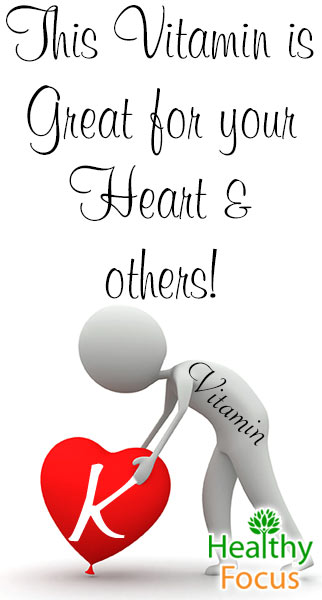Last Updated on December 8, 2016 by Marc Seward
The Benefits of Vitamin K2
It is often overlooked by both medical experts and the public in general, but recent research has begun to reveal just how important vitamin K2 is in fighting a number of illnesses as well as protecting our body from major health risks like heart disease and cancer. New research revealing the importance of this nutrient is being published at an ever increasing pace.
When it comes to vitamins, the K vitamins seem to be the least understood and historically the most undervalued. In researching this article I have come across plenty of confusion regarding vitamin K so before going any further, I will try to clarify in the simplest terms possible the differences between vitamins K1 and K2.
Vitamin K in general:

Vitamin K1
Vitamin K1 present in leafy green vegetables such as spinach, sprouts, kale and broccoli.
Vitamin K1 goes directly to the liver where it is used to activate healthy and efficient blood clotting.

Vitamin K2
Vitamin K2 is produced by bacteria and the best source is certain fermented foods such as cheese, sauerkraut, chicken liver and in particular a Japanese food called natto.
Unlike vitamin K1, it does not accumulate in the liver, instead other tissues use vitamin K2 to deposit calcium in the correct places like your teeth and bones.
Unfortunately, the Western diet does not provide adequate amounts of vitamin K2 and while the body has the ability to convert vitamin K1 into K2, the amount that is produced in this manner is not sufficient.
Vitamin K2 is further complicated by the fact that there are several types of it. MK-4 and MK-7 are considered to be the most important forms and they each have very different functions. MK-4 works in a similar way to vitamin K1 but is considered to be an ineffective dietary supplement because of its very short half-life. MK-7 on the other hand has a variety of health applications; it remains active longer in your body for a much longer period and it is vitamin K as MK-7 which has been the subject of so much of the recent research. MK-7 is most abundant in the Japanese fermented soy product natto from which it is extracted to produce MK-7 supplements.

So why is vitamin K2 so important for your health?
Numerous studies have revealed that vitamin K2 has a host of very positive medical benefits.
1. Heart Health
One of the most important benefits of vitamin K2 is its ability to protect the arteries from calcification. Calcification of the arteries is a major cause of heart disease and the link between calcification and vitamin K2 deficiency has been well researched. Vitamin K2 is vital in regulating calcium in the body which has implications for both heart and bone health. The risk of heart attack is significantly increased by calcification which is a leading cause of death in the Western world. Research shows that healthy arteries contains between 20 and 50 times more vitamin K2 than unhealthy arterial tissue.
Research carried out in Rotterdam in 2004 showed that a high Vitamin K2 intake has a powerful protective effect on heart health resulting in significantly lower risk of calcification, risk of heart attack and mortality. These results have been supported by more recent research on postmenopausal female subjects.
Recent findings at the University of Maastricht published in 2015 in ‘Thrombosis and Haemostasis’ indicate that vitamin K2 as MK-7 has huge potential in cardiovascular health. The research carried out on 244 postmenopausal women was conducted over 3 years and showed that women who took a vitamin K2 (MK-7) supplement significantly improved their arterial elasticity as well as decreasing arterial calcification.
2. Prostate Cancer
A large scale study conducted in Germany in 2008 demonstrated that Vitamin K2 had a major impact in preventing the development of prostate cancer. The research which was carried out over an 8 year period using 11,319 men showed that those with the highest intake of K2 demonstrated a 63% reduction of advanced prostate cancer.
3. Osteoporosis Protection
Vitamin K2 is a major part of the Japanese diet where natto is a traditional breakfast food in many areas of Japan. The impact of vitamin K2 on healthy bones is evidenced by the fact that the Japanese who have natto as part of their diet are many times less likely to develop osteoporosis and less prone to bone fracture than cultures which don’t get enough vitamin K-2.
Scientific studies have supported this evidence by revealing the strong relationship between vitamin K-2 and the incidence of bone fracture. A 3 year study conducted in 2006 revealed that those with a high intake of natto protected the bones from weakness and preserved bone density.
More recent research published in 2008 linked consumption of vitamin K2 to hip bone protection. This research identified K2 from natto consumption as the most important ingredient in maintaining healthy bones.
Studies have frequently shown that vitamin K-2 specifically in the form of MK-7 is more important to bone health than Vitamin K-1.
4. Rheumatoid Arthritis
Vitamin K2 might also be helpful in the fight against rheumatoid arthritis and might form part of a treatment regimen when combined with traditional anti-inflammatory medication. A Japanese study published in 2008 showed that Vitamin K-2 inhibited development of collagen induced rheumatism.
5. Cancer Treatment
A number of studies have been done to examine the use of Vitamin K2 in cancer treatments and the results have so far been very positive. Vitamin K2 is able to induce cell destruction in leukemia cells and laboratory experiments have demonstrated that vitamin K2 also inhibits other forms of cancer such as lymphoma and myeloma. These findings indicate that vitamin K2 has future potential in cancer treatment.
How much Vitamin K2 do you need?

There is no danger of overdosing on Vitamin K-2 because it does not accumulate in the liver and is not toxic. There is no definitive recommended daily dose but experts suggest between 50 and 145 mcg per day for adults.
- People taking blood thinning medication like Coumadin and Lovonox should be careful however, as vitamin K2 can interfere with the medicine’s effects.
Best Sources of Vitamin K2
Given its ability to slow down many of the severe effects of aging such as osteoporosis and calcification of the arteries, it is vital that we get enough vitamin K2 into our system. The western diet falls well short in this regard as vitamin K2 is only present in certain fermented food.
The best source of vitamin k2 is natto which is cheap and readily available in Asian food stores. Eaten daily, natto would provide more than enough vitamin K2. I have never eaten it, but research tells me that it many westerners find it unpalatable.
Vitamin K2 is also present in certain European cheeses and who doesn’t love cheese? Not all cheeses contain vitamin K2 however and those with the highest vitamin K2 content are edam which I find very bland, brie and gouda.
Fermented vegetables are another source of vitamin K2, specifically sauerkraut while most yogurt has very little of the vitamin.
If you cannot get enough vitamin K2 from your diet then you might want to consider a supplement instead. The best supplement is vitamin k2 in the form of MK-7 which has a number of advantages when compared to MK-4. M k-7 is naturally derived, remains longer in the body and is effective for longer. Because of its longer half-life you are it can be taken more conveniently just once daily.
While this vitamin was unknown until just over a decade ago, we are gaining a lot more understanding of its value. It is important that you get sufficient Vitamin K2 to combat some of the detrimental effects of the aging process. There is no way of testing whether you are deficient in vitamin K2 but you might have symptoms like osteoporosis or heart disease which would indicate that you need to think seriously about increasing your intake.


Leave a Reply
You must be logged in to post a comment.